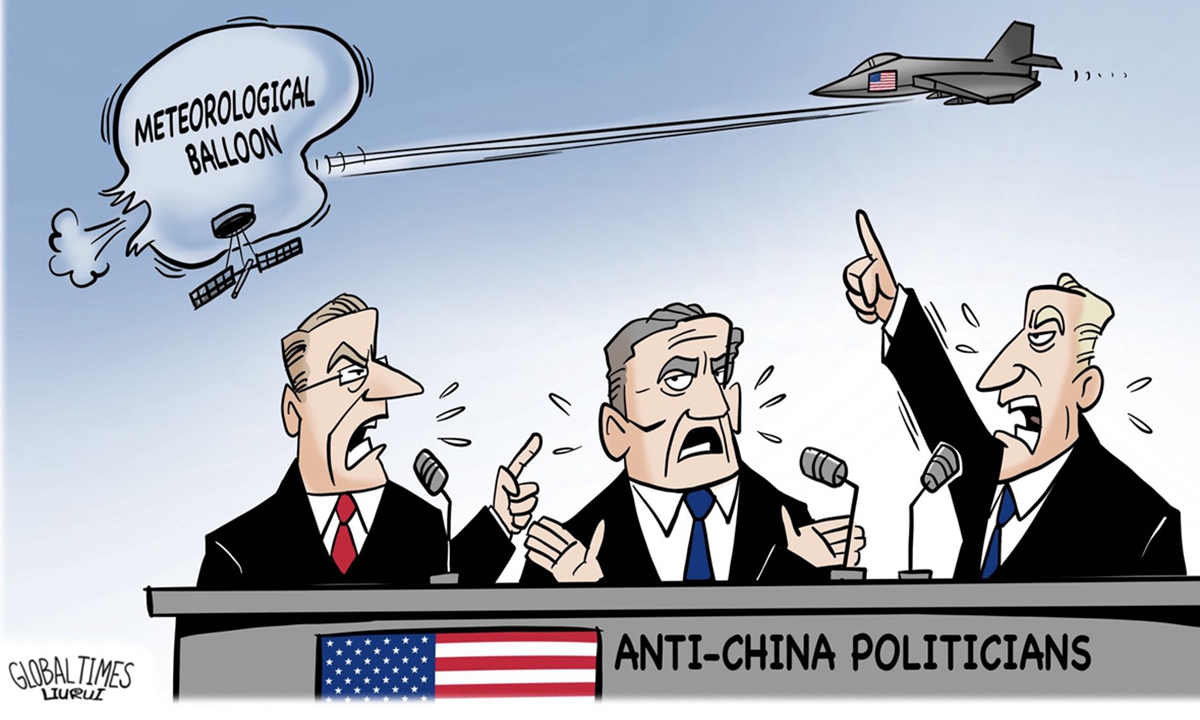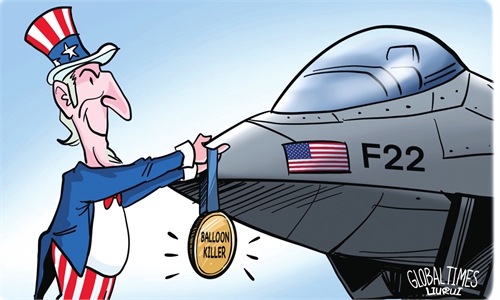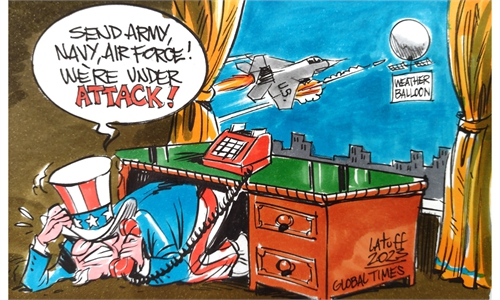
Illustration: Liu Rui/GT
What's the top blockbuster this February? While the heat over China's sci-fi movie The Wandering Earth 2 has not faded yet, the "Wandering Balloon" series arguably went more viral.
The leading character in this drama was a civilian airship from China. Intended for mainly meteorological research, it accidentally deviated from its planned course affected by the Westerlies and strayed into US airspace.
Uncle Sam was immediately gripped by hysteria. In a knee-jerk reaction, American politicians and media quickly called it a "spy balloon" and clamored to hold China accountable. Secretary of State Antony Blinken postponed his trip to Beijing. On February 4, the US went even further and sent a fighter jet to shoot down the balloon off its East Coast with a missile.
"Hurray! A victory for the US!" Some declared. To them, the US has successfully defended itself against a deliberate provocation from its most serious competitor.
But is this true?
China has repeatedly stated that the airship was for civilian use rather than intelligence gathering. And according to the Pentagon's assessment, the balloon didn't "present a military or physical threat to people on the ground."
The Convention on International Civil Aviation stipulates that "every State must refrain from resorting to the use of weapons against civil aircraft in flight." As no clear threat was identified and the "surveillance balloon" theory unconfirmed, there should have been more appropriate and professional ways to deal with the balloon as it was leaving US airspace.
However, this is almost impossible when some American politicians are in a state of paranoia on anything related to China. As The Washington Post observed, those in Congress "did not stop their hyperventilating," some even connected the incident with Gen. Mike Minihan's appalling prediction of a war with China in 2025. Also, all kinds of "spy balloon" conspiracies popped out overnight. A US defense official claimed that "PRC government surveillance balloons transited the continental United States briefly at least three times during the prior administration" and "once at the beginning of this administration." Well then, why did the US wait until now to respond?
More ridiculously, this official concluded that "these balloons are all part of a PRC fleet of balloons developed to conduct surveillance operations." Even the American media have noted that releasing "spy balloons" is an outdated surveillance method, providing little value added over what could be collected through satellites. Why should China, "a pacing challenge" in the words of US Defense Secretary Lloyd J. Austin, use such a primitive and conspicuous method to glean information?
To some extent, the anti-China paranoia speaks more about what the US, not China, has done. After all, the US is the indisputable master of spying.
During the Cold War era, the US carried out a series of reconnaissance operations to spy on the Soviet Union with camera-equipped espionage balloons, including Project Moby Dick, Project Skyhook, Project Mogul, Project Grandson and Project Genetrix. In the 1950s, the US regularly flew high-altitude U-2 surveillance planes over the Soviet Union, one of which was shot down by a Soviet missile in 1960.
In recent years, the US has been applying the same playbook to China. In 2001, an American EP-3E Aries II reconnaissance plane was caught gathering intelligence over the South China Sea. And in 2016, a Chinese naval ship seized an unmanned US underwater vehicle in the South China Sea. Just as CNN host Fareed Zakaria admitted in his program, "We spy on them (China) all the time. We have the largest spy apparatus in the world."
At a time when the world expects China and the US to ease bilateral tensions, the US' reaction to the "wandering balloon" is disappointing. Its politicians and media eagerly took the chance to drum up Sinophobia, and the US government has been hijacked by this mood. People cannot help but question the sincerity of the US to properly manage its relations with China, the most consequential bilateral relationship in the world.
A line from The Wandering Earth 2 may provide some inspiration: "Solidarity is the symbol of the birth of human civilization." In trying times, it is all the more important for major countries to find a way out together. To choose otherwise could risk making great power politics a self-fulfilling prophecy.
The author is a commentator on international affairs, writing regularly for the Global Times, China Daily, etc. He can be reached at xinping604@gmail.com.



